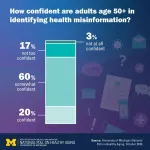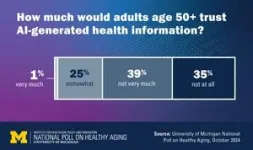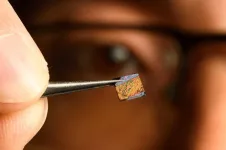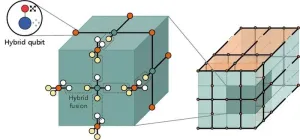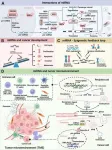(Press-News.org) While the vast majority of people over 50 look for health information on the internet, a new poll shows 74% would have very little or no trust in such information if it were generated by artificial intelligence.
Meanwhile, 20% of older adults have little or no confidence that they could spot misinformation about a health topic if they came across it.
That percentage was even higher among older adults who say their mental health, physical health or memory is fair or poor, and among those who report having a disability that limits their activities. In other words, those who might need trustworthy health information the most were more likely to say they had little or no confidence they could spot false information.
Among all older adults who have searched for health information online recently, only 32% said it’s very easy to find something accurate.
The new findings come from a report on health literacy among people age 50 and older, produced by a team from the University of Michigan and AARP using data from the National Poll on Healthy Aging.
The authors note that health systems, academic institutions, nonprofit organizations and government agencies could use the results to help them produce and promote accurate and easy-to-understand health information in multiple formats. They also point to an opportunity for organizations to help older adults understand how to find trustworthy health information for themselves or others.
The poll is based at the U-M Institute for Healthcare Policy and Innovation, and supported by AARP and Michigan Medicine, U-M’s academic medical center.
“Amid this lack of trust, our findings also highlight the key role that health care providers and pharmacists play as trusted health messengers in older adults’ lives, and even the role that friends or family with medical backgrounds can play,” said poll director Jeffrey Kullgren, M.D., M.P.H., M.S., a primary care physician at the VA Ann Arbor Healthcare System and associate professor of internal medicine at U-M. “We also find that websites run by health organizations are seen by most who use them as very trustworthy, which suggests a need to encourage more people to use them.”
In all, 84% of older adults said they had gotten health information directly from a health care provider, pharmacist or friend or family member in the past year. More than 70% of them rated the health professionals as very trustworthy, but 62% said the same about friends and family with medical backgrounds.
The poll also asked older adults about how much they used and trusted specific types of online sites offering health information, from .com sites focused on such topics, to university, hospital, government and health-related nonprofit sites.
In all, 58% of all older adults polled said they had used at least one such site for information in the past year. The kind of site used by the highest percentage of people was 39% for .com health information sites such as WebMD and Healthline, followed by 31% saying they had visited a health system’s website.
Among those who had used a .com site, 36% said they felt its information was very trustworthy, compared with 59% of those who had visited a health care system’s website. Far smaller percentages had visited sites run by federal government agencies (21%), nonprofit organizations such as the American Heart Association or American Cancer Society (14%) and universities or medical schools (11%). But among those who had visited such sites, around 60% said they felt these sites were very trustworthy.
“Older adults are increasingly turning to the internet for health information, yet there is a significant trust gap, particularly with AI-generated content,” said Indira Venkat, AARP Senior Vice President of Research. “While AI advancements offer promising opportunities to support healthy aging, this poll underscores the urgent need for reliable, accessible health resources. Ensuring that older adults have trustworthy information from health care providers and credible websites is crucial as we navigate the evolving landscape of digital health.”
AARP provides free resources on the possibilities and perils of AI at www.aarp.org/AI. In addition, Senior Planet from AARP, a flagship program of AARP’s charitable affiliate Older Adult Technology Services, offers free online classes on how AI is being used in everyday life, how to spot it, what the current advances and limitations are, and how it will shape the future.
Other findings about health literacy
The poll also asked about more traditional forms of health literacy and trust in health information. Among the findings:
18% of the older adults polled said they did not use the internet to look up health information at all in the past year; this percentage was highest among those over age 65 (24%), those who are Black and non-Hispanic (25%) and those with a high school education or less (26%).
14% disagreed completely or somewhat with the statement that it’s easy to understand written information from their health care provider, while 8% said the same about information they receive verbally from the provider
26% were not confident they knew or could find information about what an upcoming medical procedure would cost them out of pocket; 20% said the same about potential prescription costs and 18% said they same about upcoming office visits
When it comes to prescription medicines, 90% agreed completely or somewhat that their medication bottle labels are easy to understand, and 91% agreed that the information that comes with their prescription medicines is easy to understand
If they were asked to fill out medical forms, 82% felt extremely or quite a bit confident they could do it themselves, but 5% were a little bit or not at all confident.
The poll report is based on findings from a nationally representative survey conducted by NORC at the University of Chicago for IHPI and administered online and via phone in February and March 2024 among 3,379 adults age 50 to 101. The sample was subsequently weighted to reflect the U.S. population. Read past National Poll on Healthy Aging reports and about the poll methodology.
END
Most older adults don’t trust AI-generated health information — but many aren’t sure what to trust
20% of people age 50 and up aren’t confident they can spot health-related misinformation; rates are higher among those with health issues or disabilities
2024-10-16
ELSE PRESS RELEASES FROM THIS DATE:
Invention quickly detects earliest sign of heart attack
2024-10-16
With heart attacks, every second counts. A new blood test diagnoses them in minutes rather than hours and could be adapted as a tool for first responders and people at home.
“Heart attacks require immediate medical intervention in order to improve patient outcomes, but while early diagnosis is critical, it can also be very challenging—and near impossible outside of a clinical setting,” said lead author Peng Zheng, an assistant research scientist at Johns Hopkins University. “We were able to invent a new technology that can quickly and accurately establish if someone is having a heart attack.”
The proof-of-concept work, which can be modified to detect infectious ...
New research confirms that young adults can also have large vessel occlusion strokes thought to happen in older adults, given the rise of stroke risk factors in younger adults
2024-10-16
New research published in the Journal of Stroke and Cerebrovascular Diseases confirms that strokes thought to happen in older adults are possible in the younger (defined as 18-50 years old) population. Large Vessel Occlusion Acute ischemic Strokes (LVO-AIS) are considered to be the most debilitating strokes which occur due to blockage of large cerebral arteries usually from blood clots or plaque build up. LVO-AIS is typically thought to occur in older adults given that older individuals are known to have risk factors for large vessel occlusions. However, new research confirms that the younger population can have risk factors ...
Grasslands live in the climate change fast lane
2024-10-16
Although all ecosystems are affected by a changing climate, the impacts can take a while to appear. Changes in forest biodiversity, for example, are known to lag behind changes in a habitat's temperature and precipitation.
Grasslands, on the other hand, are responding to climate change almost in real time, according to new research by the University of Michigan. Put another way, forests accumulate climate debt while grasslands are paying as they go, said the study's lead authors, Kai Zhu and Yiluan Song.
"Climate change does have consequences for our ecosystems. It's going to come sooner or later," said Song, a postdoctoral fellow at the ...
Mount Sinai Doctors to present at ID Week 2024
2024-10-16
Experts in infection prevention and control at the Mount Sinai Health will present new research and insights at ID Week, the joint annual meeting of the Infectious Diseases Society of America, the Society for Healthcare Epidemiology of America, the HIV Medicine Association, the Pediatric Infectious Diseases Society, and the Society of Infectious Diseases Pharmacists in Los Angeles from October 16-19.
Mount Sinai doctors and researchers are also available for comment on breaking health news including the flu, COVID variants, HIV/AIDS, mpox, West Nile virus, measles, and fall vaccinations.
PRESENTATIONS and POSTER SESSIONS
*All abstracts and presentations ...
Rewriting the future: New molecules reversibly change with light and heat
2024-10-16
In this age of cloud storage, few people are backing up data on CD-RWs. The technology to rewrite data on compact discs was made possible by phase-change materials altered by the light and heat of lasers, though this had a limit of 1,000 rewrites. Today, scientists investigating photoswitching molecules, which change their properties when irradiated, have been finding possible applications for these materials, ranging from photopharmacology to data storage.
Osaka Metropolitan University Graduate School of Engineering student Shota Hamatani, Dr. Daichi Kitagawa, a lecturer, and Professor Seiya Kobatake synthesized aza-diarylethenes, which have nitrogen in place of carbon in a molecular structure ...
New breakthrough in quantum computing development, hybrid quantum error correction technology
2024-10-16
A major challenge in realizing quantum computers is the development of 'quantum error correction' technology. This technology offers a solution for addressing errors that occur in the qubit, the basic unit of quantum computation, and prevents them from being amplified during the computation. Without quantum error correction, it would be impossible for quantum computers to outperform classical counterparts, and thus efforts to advance this technology are ongoing worldwide.
Dr. Seung-Woo Lee's research team at the Korea ...
Unlocking the future: Information processing at the speed of light
2024-10-16
The integration of photonics into quantum computing has profound implications across various domains. As the demand for faster and more secure computational capabilities intensifies, photonic quantum computing emerges as a pivotal force, with the photonics market projected to reach USD 837.8 billion by 2025.
Harnessing the unique properties of light, photonic quantum computing revolutionizes data processing by encoding information in photons, offering unprecedented speed and efficiency for solving complex problems that traditional methods struggle to address. Photonic quantum computers can ...
A new chapter in cancer treatment: Innovative strategies and technologies of miRNA
2024-10-16
This study is led by Dr. Shiwei Duan (Department of Clinical Medicine, School of Medicine, Hangzhou City University, Hangzhou, Zhejiang, China). His team analyzed literature on miRNA, summarizing the close relationship between these small molecules and cancer. miRNA is a type of non-coding RNA that does not encode proteins, but can target more than 60% of human protein-coding genes. They play crucial roles in cell growth, differentiation, development, and apoptosis, and their dysfunction is closely linked to numerous diseases. Almost all known cancer cells have the ability to control gene expression using miRNAs, making the impact of miRNAs particularly significant ...
Silicon metasurfaces unlock broad-spectrum infrared imaging.
2024-10-16
Infrared imaging technology is crucial for advancing our understanding of the world, from exploring biological specimens to inspecting complex materials and detecting hidden patterns in physical systems. Infrared light can penetrate fog and smoke, making it invaluable for search and rescue, firefighting, and sensitive operations. Additionally, infrared imaging can enable visualising the heat emitted by objects, making it a powerful tool for night vision and security applications. While infrared cameras are valuable tools for enhanced ...
New research suggests: To get patients to accept medical AI, remind them of human biases
2024-10-16
While people are growing more accustomed to AI-driven personal assistants, customer service chatbots and even financial advisors, when it comes to healthcare, most still want it with a human touch.
Given that receiving healthcare is a deeply personal experience, it’s understandable that patients prefer it to come from, well, a person. But with AI’s vast potential to increase the quality, efficacy and efficiency of medicine, a push toward greater acceptance of artificial intelligence-driven medicine could unlock benefits ...
LAST 30 PRESS RELEASES:
Blood test “clocks” predict when Alzheimer’s symptoms will start
Second pregnancy uniquely alters the female brain
Study shows low-field MRI is feasible for breast screening
Nanodevice produces continuous electricity from evaporation
Call me invasive: New evidence confirms the status of the giant Asian mantis in Europe
Scientists discover a key mechanism regulating how oxytocin is released in the mouse brain
Public and patient involvement in research is a balancing act of power
Scientists discover “bacterial constipation,” a new disease caused by gut-drying bacteria
DGIST identifies “magic blueprint” for converting carbon dioxide into resources through atom-level catalyst design
COVID-19 vaccination during pregnancy may help prevent preeclampsia
Menopausal hormone therapy not linked to increased risk of death
Chronic shortage of family doctors in England, reveals BMJ analysis
Booster jabs reduce the risks of COVID-19 deaths, study finds
Screening increases survival rate for stage IV breast cancer by 60%
ACC announces inaugural fellow for the Thad and Gerry Waites Rural Cardiovascular Research Fellowship
University of Oklahoma researchers develop durable hybrid materials for faster radiation detection
Medicaid disenrollment spikes at age 19, study finds
Turning agricultural waste into advanced materials: Review highlights how torrefaction could power a sustainable carbon future
New study warns emerging pollutants in livestock and aquaculture waste may threaten ecosystems and public health
Integrated rice–aquatic farming systems may hold the key to smarter nitrogen use and lower agricultural emissions
Hope for global banana farming in genetic discovery
Mirror image pheromones help beetles swipe right
Prenatal lead exposure related to worse cognitive function in adults
Research alert: Understanding substance use across the full spectrum of sexual identity
Pekingese, Shih Tzu and Staffordshire Bull Terrier among twelve dog breeds at risk of serious breathing condition
Selected dog breeds with most breathing trouble identified in new study
Interplay of class and gender may influence social judgments differently between cultures
Pollen counts can be predicted by machine learning models using meteorological data with more than 80% accuracy even a week ahead, for both grass and birch tree pollen, which could be key in effective
Rewriting our understanding of early hominin dispersal to Eurasia
Rising simultaneous wildfire risk compromises international firefighting efforts
[Press-News.org] Most older adults don’t trust AI-generated health information — but many aren’t sure what to trust20% of people age 50 and up aren’t confident they can spot health-related misinformation; rates are higher among those with health issues or disabilities
